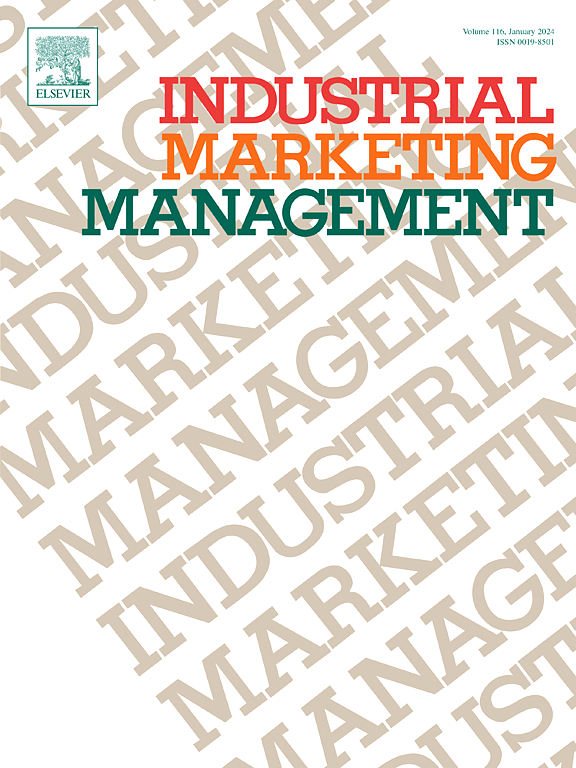Unite and conquer – End-to-end value creation through intra-organizational purchasing-sales integration
IF 7.5
1区 管理学
Q1 BUSINESS
引用次数: 0
Abstract
An effective value chain depends on the seamless flow of goods, services, and information between chain partners. A rich literature describes how a firm's purchasing function may develop effective co-creation relationships with upstream suppliers, while its sales function co-creates value with downstream customers. However, effective end-to-end (E2E) value creation is often hampered by the missing relationship between a firm's purchasing and sales functions. Especially in industrial manufacturing firms, purchasing and sales often operate independently from each other resulting in lost opportunities and inefficient supply chains. Although buying and selling are often treated as separate disciplines, academics increasingly emphasize the need for effective purchasing-sales integration (PSI).
Inspired by two Special Issues of Industrial Marketing Management on the purchasing-sales interface, we contribute to this emerging literature with an integrated academic-practitioner perspective. Based on extensive practical and academic experience, we develop a conceptual framework that integrates the scope and intensity of PSI, illustrate it with numerous practical examples, and formulate guidelines for management to strengthen their organizations' PSI. In addition, we present several theoretical propositions and suggestions for both future research and for business schools to connect purchasing and sales in terms of their curriculum, degrees, course materials, research projects, and collaboration with practitioners.
团结和征服-通过组织内部采购-销售整合创造端到端的价值
有效的价值链依赖于商品、服务和信息在价值链合作伙伴之间的无缝流动。丰富的文献描述了企业的采购职能如何与上游供应商发展有效的共同创造关系,而其销售职能如何与下游客户共同创造价值。然而,有效的端到端(E2E)价值创造经常受到企业采购和销售职能之间缺失关系的阻碍。特别是在工业制造企业中,采购和销售往往相互独立,导致机会丧失和供应链效率低下。虽然购买和销售通常被视为独立的学科,但学术界越来越强调有效的购销整合(PSI)的必要性。受《工业营销管理》两期关于采购-销售界面的特刊的启发,我们以整合的学术-实践视角为这一新兴文献做出贡献。基于广泛的实践和学术经验,我们开发了一个概念框架,整合了PSI的范围和强度,用大量的实际例子来说明它,并制定了管理指导方针,以加强其组织的PSI。此外,我们为未来的研究和商学院在课程、学位、课程材料、研究项目以及与从业者的合作方面将采购和销售联系起来提出了一些理论主张和建议。
本文章由计算机程序翻译,如有差异,请以英文原文为准。
求助全文
约1分钟内获得全文
求助全文
来源期刊

Industrial Marketing Management
Multiple-
CiteScore
17.30
自引率
20.40%
发文量
255
期刊介绍:
Industrial Marketing Management delivers theoretical, empirical, and case-based research tailored to the requirements of marketing scholars and practitioners engaged in industrial and business-to-business markets. With an editorial review board comprising prominent international scholars and practitioners, the journal ensures a harmonious blend of theory and practical applications in all articles. Scholars from North America, Europe, Australia/New Zealand, Asia, and various global regions contribute the latest findings to enhance the effectiveness and efficiency of industrial markets. This holistic approach keeps readers informed with the most timely data and contemporary insights essential for informed marketing decisions and strategies in global industrial and business-to-business markets.
 求助内容:
求助内容: 应助结果提醒方式:
应助结果提醒方式:


